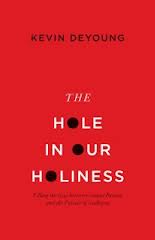I just finished reading Kevin Deyoung’s book The Hole in Our Holiness. I found the book to be very good. I was blessed by it.
The book is short and easy to read. It only has 146 pages, and it is 10 chapters long so someone can quite easily read a chapter a day.

On the second page of the book, Deyoung states his purpose “The hole in our holiness is that we don’t really care much about it.”
This purpose in writing is very necessary. Sadly, Christians and non-christians alike are not very concerned or even interested in being like God. The remainder of the book does a good job addressing this “hole.”
I loved the book. For the many, many on-fire young Christians coming up in the church today, I would highly recommend you read this book. Read it so that it sinks in. So that you get it. And for the hundreds of Bible verses he quotes, make sure you get those too. This book is about what God is saying to us.
Here are some of my favorite quotes from the book:
Chapter 1: “No matter what you profess, if you show disregard for Christ by giving yourself over to sin –impenitently and habitually– then heaven is not your home.” (14) “You would not be happy there [in heaven] if you are not holy here.” (15)
“The Great Commission is about holiness. God wants the world to know Jesus, believe in Jesus, and obey Jesus.” (16)
Chapter 2: J.I. Packer “In reality, holiness is the goal of our redemption.” (24)
“To find acquittal from God on the last day there must be evidence flowing out of us that grace has flowed into us.” (26)
Chapter 3: “In other words, sanctified is what we are and what we must become.” (33)
“Or to put it another way, worldliness is whatever makes sin look normal and righteousness look strange.” (37)
“If you want to know what holiness looks like, look at God.” (39)
Chapter 4: “Let’s not be afraid to land on law– never as the means of meriting justification, but as the proper expression of having received it.” (54)
“Preachers must preach the law without embarassment. Parents must insist on obedience without shame.” (55)
Chapter 5: “The truth is God’s people can be righteous– not perfectly, but truly, and in a way that genuinely pleases God.” (64)
“Love does not equal unconditional affirmation. Love entails the relentless pursuit of what is for our good.” (73)
“When we sin, our union with Christ is not in jeopardy. But our communion is.” (74)
Chapter 6: John Owen “from a self-strength, carried on by ways of self-invention, unto the end of a self-righteousness, is the soul and substance of all false religion in the world.” (80)
Chapter 7: “Christ justifies no one whom he does not also sanctify.” (99)
“Do not strive after holiness because you cower in dread of God. Strive after holiness because you are confident you already belong to God.” (102)
Chapter 8: “In moving from darkness to light, one of the first things new Gentile converts had to accept was a radically different sexual ethic.” (109)
“Don’t reason with sexual sin, just run.” (111)
Chapter 9: “The man who attempts Christianity without the church shoots himself in the foot, shoots his children in the leg, and shoots his grandchildren in the heart.” (132)
Chapter 10: (This is one of the best chapters that I have read in a book in a long time. Very good!)
“when it comes to sanctification, it’s more important where you’re going than where you are. Direction matters more than position.” (138)
“Remember, it’s the testimony of all saints that as they get closer to God they see more of their ungodliness. It’s normal to feel less holy as you become more holy.” (139)
“Repentance is a way of life for the holy child of God.” (140)
“It’s one thing to sin your heart out, mumble a few sorrys, and get on with life. It’s quite another thing to hate your sin, cry out to God, and make a spiritual U-turn. Real contrition is hard, painful work.” (140)
“[Repentance] means admitting specific wrong, recognizing your offensiveness to God, changing course, turning to Christ, and wishing with all your heart you had never made the mistake you now despise.” (141)
“Godly grief doesn’t blame parents or the schools or the government or friends or the church. Godly grief says, “Have mercy on me, O God”” (143)

Leave a Reply